|
|
|
Sort Order |
|
|
|
Items / Page
|
|
|
|
|
|
|
| Srl | Item |
| 1 |
ID:
106824
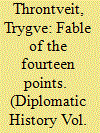

|
|
|
|
|
| Publication |
2011.
|
| Summary/Abstract |
For decades, scholars have turned to Woodrow Wilson's Fourteen Points address of January 8, 1918, to explain his vision for a new international order after World War I. And for decades, one particular phrase has been closely linked to that vision: "self-determination." The phrase, however, appears nowhere in Wilson's address. Moreover, it is often shorthand for "national self-determination," connoting an ethno-nationalist political ideal Wilson never held. Rather, Wilson idealized self-government: the right of all to help direct their society's public affairs. By 1918, Wilson sought to promote both national and international self-government through a deliberative League of Nations, equipped to accommodate changes in an increasingly interdependent global society. Prejudiced though he was, Wilson envisioned an egalitarian League, with adequate sovereign powers to advance justice within and among nations. Though Wilson poorly communicated this radical yet pragmatic ideal, it was his late abandonment of pragmatic compromise that prevented U.S. League membership. That outcome, despite its contingency, has limited American views of the nation's global role ever since.
|
|
|
|
|
|
|
|
|
|
|
|
|
|
|
|
| 2 |
ID:
105358
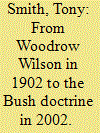

|
|
|
|
|
| Publication |
2011.
|
| Summary/Abstract |
The secular notion of American exceptionalism divorced from explicit racial or religious expression and based on governmental institutions and civic virtue - America as 'the last, best hope of earth' (Lincoln), America as 'the ark of the liberties of the world' (Melville) - goes back to the American Revolution. Nevertheless, before Wilson the conceptual framework that could explain the rightness of American global expansion in terms of bringing democratic government to others had not been well formulated. With Wilson, by contrast, the United States for the first time could present in secular terms, concepts argued from a cultural and historical perspective that made the expansion of American influence around the globe legitimate, not only in terms of national security but to the benefit of all mankind. Here is the key, I would propose, to the self-confidence and self-righteousness, which has been the hallmark of American foreign policy for a century now. Democracy promotion (associated with open markets economically and multilateralism) reflected America's cultural superiority (inherited from racial thinking), as well as its mission to help others (descended from its religious background). In Wilson's hands, an enduring framework for American foreign policy was born, one that remains with us to this day.
|
|
|
|
|
|
|
|
|
|
|
|
|
|
|
|
| 3 |
ID:
130823
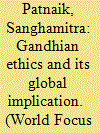

|
|
|
|
|
| Publication |
2014.
|
| Summary/Abstract |
Politics is the most crucial human activity that involves governance. Ethics is the set of principles those regulate the activity of governance and administration. Before we focus on Gandhian Ethics it is necessary to focus on the two schools of thought - Idealism and Realism. Idealism was an approach to international politics based upon liberal assumptions and principles. lt was optimistic as it envisioned a world.in which law, institutions and diplomacy replaced power, competition and use of force. This School was represented 'by St. Simon, Richard Cobden. Aldous Huxley, Russell, Mahatma Gandhi, Wilson and Margaret Mead. It gave emphasis on the role of education and international institutions to bring a better world. It focused on the Positive side of human nature. It proceeded with the assumption that the harmony of the interests was not impossible. Hans J. Morgenthau is the main exponent of realist theory. For him the central focus of realism was power. He de?ned power as "man's control over the minds and actions of other man"(Morgenthau,l993). He emphasized on: lnevitability of conflict among nations, Centrality of Power, Ever -present threat of war.
|
|
|
|
|
|
|
|
|
|
|
|
|
|
|
|
| 4 |
ID:
086968
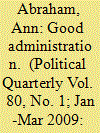

|
|
|
|
|
| Publication |
2009.
|
| Summary/Abstract |
This article relates the concept of 'good administration' to a range of key constitutional issues, including The Governance of Britain, the debate about a British Bill of Rights, the creation of the Administrative Justice and Tribunals Council, and the Law Commission's consultation on public law remedy. It argues that 'good administration', far from being remote from these issues, is a critical component of much that we value most in public life. By drawing upon, for example, the Parliamentary Ombudsman's publication of Principles of Good Administration and the Court of Appeal judgment in a case concerning the Ombudsman's report on occupational pensions, the article suggests that the principles of deliberative democracy, human rights and restorative justice combine to make the Parliamentary Ombudsman an effective instrument for 'humanising the bureaucracy', as first envisaged when the Office was created by the Wilson government in 1967.
|
|
|
|
|
|
|
|
|
|
|
|
|
|
|
|
| 5 |
ID:
085129
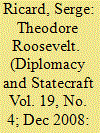

|
|
|
|
|
| Publication |
2008.
|
| Summary/Abstract |
This article argues that as the first modern US president and an innovative shaper of American foreign relations, Theodore Roosevelt launched the rising United States on the world stage as a major actor in power politics, that American diplomacy came of age with him and not with Woodrow Wilson, and that the secular pragmatist who succeeded because he was abreast of the times should not be begrudged the laurels that are so often bestowed on the religious-minded visionary who failed because he was ahead of his time. In American historiography Wilson has often eclipsed-unfairly and erroneously-the geopolitical and diplomatic skills, professionalism and expertise in foreign policy of Roosevelt. Even as ex-president, Roosevelt would be a force to be reckoned with. The use and misuse of a misconstrued legacy that some have tried to confiscate for their own benefit is perhaps best illustrated by presidential candidate John McCain's reverential claim that he is "a Teddy Roosevelt Republican" rather than a neo-Wilsonian.
|
|
|
|
|
|
|
|
|
|
|
|
|
|
|
|
| 6 |
ID:
092072
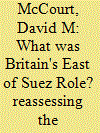

|
|
|
|
|
| Publication |
2009.
|
| Summary/Abstract |
Although often considered an objective fact, Britain's "East of Suez role" was actually a rhetorical construction. As such, it was dependent on the continued ability of Britain to "make" that role and other important players to "cast" Britain into it. But the Wilson government's initial support for East of Suez had the paradoxical effect of bringing its coherence into question. Without a British future in Aden, East of Suez was increasingly linked solely to the Far East, where, with the end of Confrontation in 1966, the argument for staying lost much of its force. Other interested Powers were also increasingly unable to cast Britain into the role: the nationalist tide and the United States' tribulations in Vietnam being primary factors. The article thus shows that thinking through the implications of this realisation provides a better understanding of the withdrawal than by resting on economic or domestic political factors alone.
|
|
|
|
|
|
|
|
|
|
|
|
|
|
|
|
|
|
|
|
|